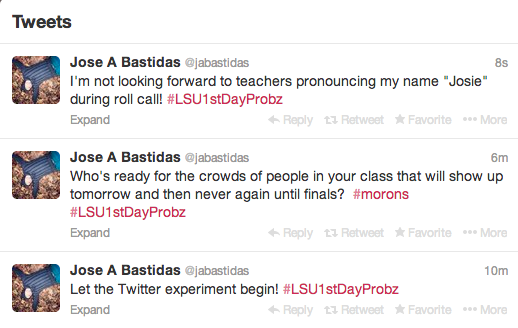We are all obsessed with Twitter, but we are mostly unaware of how it works.
Whether it’s to stay on top of world news, read 140-character jokes from “Condescending Wonka” or “Total Frat Move” or rant, Twitter has revolutionized the way we communicate with the outside world.
But what makes one tweet more noticeable than others? Is it the great use of complex vocabulary, the outrageousness of what is being said or simply how moronic a person seems?
Multiple studies have been made on the subject. TrackMaven concluded the way a tweet is composed is key to it receiving recognition. Indiana University stated the likeliness of a tweet receiving attention depends on the structure of the network and the audience’s attention span.
So which one is it? Is becoming Twitter famous a big game of chance or a well-crafted conspiracy theory?
It’s a combination of both. What a person says on Twitter inspires others to respond, but timing and what is trending also plays a key role.
Take Elan Gale for example: On Thanksgiving Day, Gale posted live tweets as he took part in a passive-aggressive airplane note-passing fight with a middle-aged woman named Diane.
The fight started with a delayed flight and a disgruntled Diane, ending with a revelation on Dec. 3 that the whole thing had been a hoax.
Gale had succeeded in keeping the world hooked on a fake story about holiday traveling anxiety, and he got his 15 minutes of Twitter fame in the process.
But other people aren’t so lucky.
On Dec. 20, Justine Sacco, a public relations director at IAC/InterActiveCorp at the time, tweeted a comment that would put her in the spotlight and ruin her career at the same time.
“Going to Africa. Hope I don’t get AIDS. Just kidding. I’m white!” Sacco tweeted minutes before boarding a plane traveling from London to Cape Town, South Africa.
The anger she received — the hashtag #HasJustineLandedYet was trending worldwide — was mostly because of her extremely idiotic stab at dark comedy, but it was also because unfortunately her flight didn’t offer Wi-Fi, so she had no way of knowing she had to retract or apologize for her tweet before the whole world decided to metaphorically burn her at the stake one funny meme at a time.
When Sacco landed in South Africa she deleted all of her social media accounts and became the subject of debate for First Amendment rights between liberals and conservatives.
A day later, Sacco had been fired from her job at IAC and issued an apology to a South African newspaper and to ABC News. Her joke on Twitter cost Sacco her job.
So why did Sacco receive all that negative feedback from a simple joke? Was it the fact that she made an offensive joke, her timing or was it just that people saw her tweet and decided she deserved to be fired?
I have no idea. I think that predicting which tweets will go viral is about the same as guessing the outcome of a round of Russian roulette.
So I’ll be doing an experiment.
For the duration of the first day of school I will be posting outrageous comments on my Twitter account about things I see on campus.
Follow me and the hashtag #LSU1stDayProbz so you can retweet if you agree or get angry if you don’t. Let’s see if we can make me semi-Twitter famous for a few hours, or just really hated for my pretend stupidity.
Jose Bastidas is a 20-year-old mass communication junior from The Woodlands, Texas.
Opinion: Viral tweets caused by randomness and poor wit
January 14, 2014

Screenshot of Jose Alejandro Bastidas’s tweets.
More to Discover







